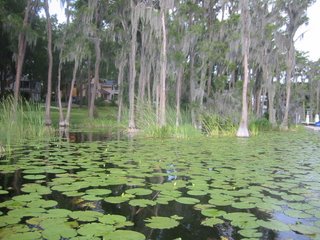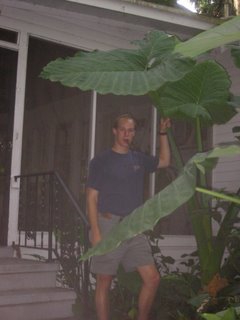It was comfortable and cool in Wal-Mart’s well-ventilated fishing section when I selected my $19.99 rod, reel and line combination. When I got down to the shore to pull the canoe out of the weeds, rod and bailing bucket in hand, it was about 96°F and the air didn’t seem ventilated at all. But, I thought, no sportsman can look for perfection. If I wanted to find fish in air-conditioned comfort I would be better off at Kroger.
So I set off on the fortuitously named Lake Butler, a few miles northwest of Orlando. But for the powerboats and multimillion-dollar homes, I would have felt an early European explorer of the Spanish main. Between houses, the shores of Lake Butler are shaded by expansive canopies of hardwood trees that fork near their bases and keep forking as they grow, such that the canopy of a single tree might cover half a football field. Long beards of Spanish moss hung from the branches and would have swayed gently in the breeze, I assume, if there had been any breeze. Closer to the ground, impossibly broad leaves were in fashion. I passed one plant taller than I am which had only seven leaves, each the size and rough shape of an elephant’s ear. If it had rained I could have stood under a single leaf and remained dry. Lush vines with leaves like oblong dinnerplates climbed some of the hardwoods, and frisbee-sized lily pads crowded the surface as far as 30 feet from shore.
I paddled toward Bird Island. It was the only unique terrain feature in paddling range of my leaky canoe and thus an obvious destination. My buddy Ben Snyder, who lives on the lake, had said that on weekends kids anchor their boats off of a sandy beach on the far side of Bird Island and get wasted, but since it was noon on a Thursday I figured most of the beer cans had probably washed away and Bird Island might be a good place to catch bream. I put my heel on top of the canoe’s leaky spot and pointed the bow at the island’s near edge. Bird Island was not a pure fishing attraction, but it would suffice.
I think the world is full of purists. A purist isolates a thing he likes – wilderness, for instance – and seeks its undiluted essence. To a purist, anything foreign which exists alongside the essence he seeks is an unwanted corruption. For example, I have a good friend who guides fishing trips on Montana’s Madison River, a famous and therefore often-fished trout stream. But my friend favors the nearby Smith River, saying that “you can float for half a day and not see a single house.” To him, the Madison, alongside of which there are a handful of houses and barns, is too crowded. My friend is very nearly a purist – instead enjoying the beauty that the Madison River offers, and seeing the buildings alongside it as enrichments rather than blemishes, sometimes I worry that he focuses on the few homes that intrude upon the wild essence he seeks. He bemoans the buildings instead of enjoying the pastoral charm of the land through which the Madison flows.
As I rounded the end of Bird Island, I saw the beaches Ben had told me about. There was a sandy strip of shoreline about 200 yards long interspersed with cypress trees so weighted with Spanish moss that I wondered how they could survive at all. I paddled hard on the right to turn the canoe toward the beach, then picked up speed and headed for the island. An osprey took off with a loud, high-pitched protest as I drew close. I drove the canoe ashore. Sand scraped against the hull and the canoe came to rest among the driftwood, in the shade of a mossy cypress and beside a broken red folding chair that someone had left behind.
Purists have chosen a very narrow route to happiness. If one exalts only in an undiluted essence, one is likely to be frustrated because our world is one of mixtures. The healthy way is to enjoy those mixtures instead of pining for a world of discrete essences. I once took a date to see the county music band “Alabama,” and she complained that their song repertoire had grown less traditional and more poppy. “This isn’t county,” she said. And while she may have been right, she would have done well to enjoy the music for what is was instead of recoiling from it because of what it was not.
Blends of essences we perceive as naturally distinct often prove fertile. Before my date and I were born, county music arose as a blend of Applachain folk and delta blues. Barn swallows nest under the eaves of suburban homes, deer browse on primly maintained flower beds, and rock doves, rechristened “pigeons,” thrive in urban centers all over the world. New systems form when old systems mingle.
I climbed out of the canoe and picked up my fishing rod. Bird Island was undeveloped. So far as I could see, it was unoccupied by anyone save me and the several herons who also prowled its shores for fish. I unhooked my lure from the rod’s first eye and reeled in line so that the lure dangled a couple inches below the rod tip. I waded in. As I waded deeper the water around my feet grew pleasantly cool. I picked out the far edge of a patch of lily pads and flipped the bail, getting ready to cast.
Then I heard the roar of a nearby boat motor and looked up. The roar came from the oversized outboard of a glittering bass boat headed straight for my beach. As he neared the shore, the boat’s beer-bellied operator cut throttle and coasted toward a cypress tree about 30 yards away. The prow of the boat dropped in a foamy splash and sent waves in every direction. When he drew close to the cypress tree the driver threw the throttle in reverse and roared to a stop. His wife tied the boat to the tree. The driver killed the engine and turned on his radio. Pop music blared across the water.
As the waves lapped against my legs I glared at him. I couldn’t help it. The purist lives in me, too.

